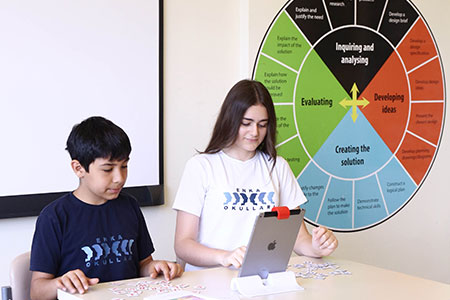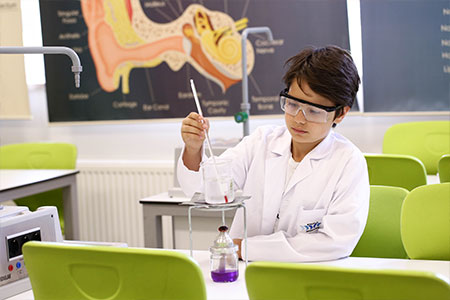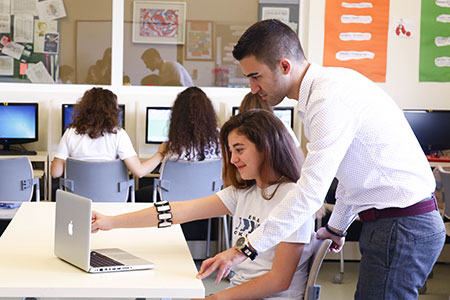MIDDLE YEAR
HISTORY OF THE PROGRAMME
The IB Diploma Programme (DP) was established in 1968 to provide an international education that would enable young people to better understand and manage the complexities of our world, and to provide them with the skills and attitudes to take action to improve it. Such an education was grounded in the more progressive educational thinking of the time but also in the belief that the world could be made better through an education that focused on concepts, ideas and issues that crossed disciplinary, cultural, national and geographical boundaries.
With the introduction of the MYP in 1994 and the Primary Years Programme (PYP) in 1997, the IB realized a continuum of international education for students aged 3–19. A decade later, the adoption of the IB learner profile across the continuum, and a profile of an internationally minded learner, provided important common ground for three strong, stand alone programmes, each developed as a developmentally appropriate expression of the IB’s educational approach. The introduction of the IB Career-related Certificate (IBCC) in 2012 builds further on the continuum by providing another choice of pathways of international education for 16–19-year-old students in addition to the DP.
The MYP has been designed as a coherent and comprehensive curriculum framework that provides academic challenge and develops the life skills of students from the ages of 11 to 16. These years are a critical period in the development of young people. Success in school is closely related to personal, social and emotional well-being. At a time when students are establishing their identity and building their selfesteem, the MYP can motivate students and help them to achieve success in school and in life beyond the classroom. The programme allows students to build on their personal strengths and to embrace challenges in subjects in which they might not excel. The MYP offers students opportunities to develop their potential, to explore their own learning preferences, to take appropriate risks, and to reflect on, and develop, a strong sense of personal identity.

Implementation of the MYP is considered to be a whole-school activity that prepares students for further successful study. The programme is designed to be inclusive; the IB believes that all students can benefit from the programme.

The MYP began as an initiative formulated by groups of practising teachers and administrators in international education who wanted to develop a curriculum for the middle years of schooling. It was intended that this curriculum would share much of the same philosophy as the DP and would prepare students for success in that programme. The first draft of the MYP curriculum was produced in 1987 when a group of practitioners created a framework that allowed for a degree of diversity. In this framework, emphasis was placed on developing the skills and attitudes, the understanding of concepts and the knowledge needed to participate in an increasingly global society.
The MYP grew out of the work and vision of practising teachers in schools. Details regarding key individuals, groups and research influences behind the development of the MYP from the first ideas in 1980 can be found in History of the Middle Years Programme (2010). In 2010, the IB began a major review of the programme, leading to the publication of this document and new guides for all subject groups in 2014.
The programme has developed significantly since its inception and will continue to do so in response to the needs of students and schools, the demands of a rapidly changing world and our changing understandings of human development and the process of learning.
PHILOSOPHY OF THE MIDDLE YEARS PROGRAMME
The International Baccalaureate (IB) offers four programmes for international education: The International Baccalaureate (IB) offers four programmes for international education:
- Primary Years Programme (PYP) – introduced in 1997
- Middle Years Programme (MYP) – introduced in 1994
- Diploma Programme (DP) – introduced in 1969
- Carrier-Related Certificate (IBCC) – introduced in 2012.

The four programmes share an educational framework:
Each programme supports the holistic education of individuals by approaching languages, humanities, science, maths and art with traditions of learning and emphasising intellectual, emotional, social and physical growth. As schools are not obliged to offer more than one programme, they are all independent programmes. However, these programmes offer schools the chance to offer a constant international education experience from early childhood to high school graduation.
MYP, which was designed for students aged 11 to 16, has been offered by the IB since 1994. The MYP is a consistent and comprehensive curriculum framework that provides academic tasks and develops essential abilities in this age group. This framework keeps the student at the centre, with a structure that supports teachers in carrying out group work to involve students in a meaningful, challenging and regular work routine that brings together a series of abilities, approaches and values.
THREE FUNDAMENTAL CONCEPTS OF THE MYP
Adolescents face a wide and generally surprising series of choices. The MYP has been designed to provide students with values and opportunities that will allow them to develop a sound judgement. From its beginnings the MYP has been guided by three main concepts that are found in the IB mission manifesto. These three main concepts are:
Holistic learning: Is the idea that all knowledge is interconnected and that the curriculum should support the development of the individual in line with the definition of the IB learner’s profile.
Intercultural awareness: Is the idea that the school community should support and encourage international awareness by relating to and exploring other cultures, which is a mainstay of international education that is reflected in the characteristics of the IB learner’s profile.
Communication: Is the idea that schools should support open and efficient cooperation and related important skills that contribute to an international understanding as given in the characteristics of the IB learner’s profile.
The MYP’s target audience is students aged between 11 and 16. This programme provides a learning framework to ensure that students become creative and critical individuals who engage in transformative thinking. The MYP encourages students to find connections between the subjects they study at school and the world at large and emphasises making an intellectual effort. It also ensures that skills needed for universal participation, intercultural understanding and communication are developed. These skills are necessary for young people to turn out to be universal leaders in the future.
The MYP is flexible enough to meet the requirements of many national and local curricula. The programme is based on the knowledge, skills and behaviours developed in the Primary Years Programme (PYP) and is intended to ensure that later on, students can meet the challenges of the IB Diploma Programme (DP) and the IB Carrier-related Certificate (IBCC).
The MYP:
- Pays attention to the intellectual, social, emotional and physical welfare and wellbeing of students holistically
- Offers students the opportunity to gain knowledge, behaviours and skills that will allow them to manage any challenge they may come up against in the future and to act responsibly against such a challenge
- Ensures deeper and more detailed understanding through its eight subject groups
- Necessitates that students should learn at least two new languages in order to better understand their own and other cultures
- Motivates students to serve the community
- Helps prepare students prepare for further education, working life and lifelong learning.
MIDDLE YEARS PROGRAMME LEARNING MODEL
The aim of all IB programmes is to raise individuals with an international mindset, who, aware of humanity and the planet we share, will contribute to building up a better and more peaceful world.
IB learners strive to achieve the following qualities:
Inquisitive and questioning: Learners develop their natural curiosity. They gain the necessary skills to run inquires and research and are independent learners. They enjoy active learning and their curiosity lasts a lifetime.
Knowledgeable: Learners investigate concepts, ideas and issues with local and global significance. Therefore, they develop a comprehensive body of interdisciplinary knowledge and understanding.
Reflective: Learners take the initiative to notice complex issues and to use their critical and creative thinking skills to solve them. Their decisions are guided by logic and morality.
Communicative: Learners perceive and express knowledge and opinions creatively, confidently and through various channels of communication in more than one language. They work actively and willingly with others.
Principled: Learners act with a sense of the right, honesty, fairness and justice. They respect the dignity of individuals, communities and societies. They live up to their own behaviour and its consequences.
Transformative thinking: Learners pay attention to their own learning process and experiences. They can evaluate their learners, and their strengths and weaknesses in order to support their personal development.
Sensitive: Learners are sensitive and respectful to the needs and emotions of people. They can put themselves in other people’s positions. They have a sense of personal commitment to serving the community and try to make a positive influence on the lives of others and the environment.
Risk taking: Learners approach unusual situations and uncertainty with courage and thoughtfulness. They possess an independent spirit that is needed to discover new tasks, ideas and strategies. They take care to be brave and relatable when defending their beliefs.
Open minded: Learners know about and admire their own cultures and personal histories. They are open to the perspectives, values and traditions of other individuals and societies. They are used to finding and evaluating different points of view and willing to improve their experience in this regards.
Balanced: Learners are aware of the value of mental, bodily and emotional balance for the health of themselves and others.

The IB Learner’s Profile brings together the 10 qualities that are most valued by the IB World Schools. We believe that these and similar qualities will help students, both individually and collectively, to become responsible individuals of local, national and universal communities.

IB programme models emphasise the important shared points of IB education:
- Developing characteristics of the learner’s profile
- Approaches to teaching and approaches to learning
- Age appropriate graduation experiences (Personal Project)
- Regular and consistent structure of subject groups and disciplines
- Main focus and context of learning being the development of international thought.
The MYP ends with a personal project completed by 5th Grade (year 10 in Turkey) students.
The MYP arranges teaching and learning in eight subject groups which are: language and literature, language acquisition, individuals and societies, science, mathematics, design, arts, physical and health education.
Subject groups are connected with each other through the universal context and key concepts.







